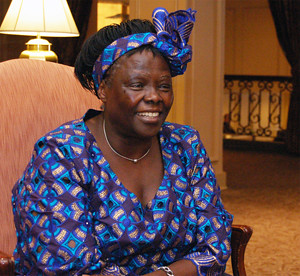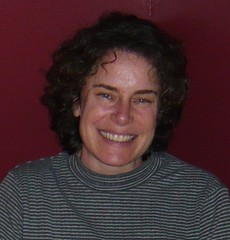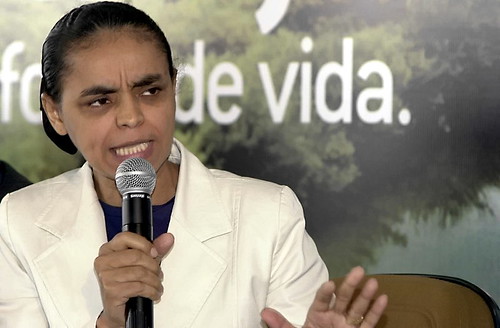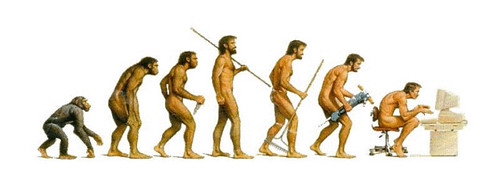FOR THE DEVELOPING WORLD
WHICH PROBLEM COMES FIRST:
POVERTY OR ENVIRONMENT?
I guess that my "conservation bible" quote on this question comes from the American naturalist Aldo Leopold who held that
We abuse land because we regard it as a commodity belonging to us. When we see land as a community to which we belong, we may begin to use it with love and respect.
But one of my Brazilian friends keeps accusing me of asking that the poor of Brazil sacrifice their economic development for the benefit of the rich. Basically he argues that my North American capitalist view causes me to put the environment first. Generally, this triggers a vigorous but truly tedious and exhausting dialectical debate between us in which I end up hoping only for some expression that might transcend the old-school ideological over-simplifications. I believe it comes from activist, politician and Nobel laureate Wangari Maathai:

About a year ago, she was interviewed by Sarah Kuck and Julia Levitt of Worldchanging:
Julia Levitt: In The Challenge for Africa, you argue that of all of the UN Millennium Development Goals for 2015, it's the seventh -- environmental sustainability -- that is most important. How is a healthy environment the keystone for all of these economic and social goals?
Wangari Maathai: The way I look at it, we tend to put the environment last because we think the first thing we have to do is eliminate poverty and send children to school and provide health. But how are you going to do that? In Kenya, one of our biggest exports is coffee. Where do you grow coffee? You grow coffee in the land. To be able to grow coffee you need rain, you need special kinds of soils that are found on hillsides, and that means you have to protect that land from soil erosion so you don't lose the soil. You also want to make sure that when the rains come you're going to be able to hold that water and have it go into the ground so that the streams and the rivers keep flowing and the ground is relatively humid for these plants. For the rains and the rivers you need forests and you need to make sure these your forests are all protected, that there is no logging, that there is no charcoal burning and all the activities that destroy the forest. All this really needs to be done so that you can be able to grow good coffee, so that you can have an income, so that you can send your children to school, so that you can buy medicine, so that you can take them to hospitals, so that you can care for the women, especially mothers.
We see that the environment is something to exploit, because we see the environment in terms of minerals for example, or forests, or even raw materials that we produce on our land, or even land itself. We see it in terms of what we can exploit rather than the medium in which all of these activities have to take place. But you can’t reduce poverty in a vacuum. You are doing it in an environment.
JL: In your book, you argue that it's most important for African people to develop solutions for their own needs instead of relying on aid from abroad. How do you envision a healthy exchange between Global North and Global South?
WM: I hope that it doesn't come out in the book that I’m saying that Africans don't need any help. What I am trying to say is that they need to learn to rely on themselves and to learn from other people, and when you learn something from other people, then you keep moving onward for yourself.
For example, they have land. The government of Qatar wants to lease the Tana River delta, which is in Kenya, from the Kenyan government, so that they can produce food there. People in Kenya need food. We have people who have studied agriculture. Why is it that if we really need food, we cannot go into the delta and develop our own food? Why do we have to have people come from afar to come and grow food for us, or to grow food to sell to us? It is partly because we are almost becoming used to people doing things for us. Like somebody else is going to solve that problem for us. And that to me is very disempowering system. And that system eventually can make you destroy yourself completely, because you are so dependent on others. Nobody in the world is completely dependent on another person, but we are all interdependent.
I was particularly talking with respect to aid, because that to me is one area that can make people so dependent, and unfortunately, that dependency starts with the government. It goes to local authorities and even to members of Parliament so that individual citizens almost become people who want to sit and wait for their member of Parliament to come and solve the problem. Now that won't take you anywhere. And if you follow it, you will see that it feeds corruption in the country.
JL: You write that African nations are being left behind in the global trend toward renewable energy. Do you have a vision for how African people and governments can work to bring renewable energy industries to African nations?
WM: We have been trying to follow the same development, often that we have learned from the industrialized world. Yet now the industrialized world is moving away from fossil fuels and moving towards renewable sources of energy. And because we have not invested so much into education, we don’t have the technology and sometimes we don't even have the capital to buy this technology. But obviously the world is moving away from high carbon energy to low carbon energy, and eventually moving away toward renewable energy. So it is in the interest of Africa to move towards that, because that's where the world is moving.
Unfortunately, I don’t believe she’s ready to shift -- and she needs to shift. So she needs to get the technology and she can only get that technology from the developed world. So the developed world should be willing to help her and support her and make this energy affordable. Because if Africa is left behind, she is going to continue pumping greenhouse gases into the atmosphere, especially carbon. She’s going to continue logging the forests, she’s going to continue burning charcoal, she is going to continue practicing agricultural activities that destroy the environment, and sooner or later Africa's problem will become a global problem.
That is why it is in the interest of the developed world to help her, and it is one of the reasons why I say we all need to work together to save the Congo forest, because if we don’t save the Congo forest, the Amazon forest and the southeast Asia forest, if those forests release the carbon they are trapping at the moment, much of what you will be doing in the North will be negated by the amount of carbon released into the atmosphere. So this issue of carbon is one area where we really need to work together and if people don’t have the technology they need, that technology needs to be made available and affordable.
Sarah Kuck: In the documentary Taking Root, you said that after you went to America for university, it was very hard to re-adjust to the level of women’s rights in Kenya. Can you talk about how things have changed for African women since the ’60s and what struggles women are still encountering?
WM: Things have changed tremendously. Most parents want to send their children to school, including girls, and usually poverty is the big blockade that makes them not do that. Human rights have also greatly improved. There are laws that allow women to own property, to buy property and to inherit equally as men. But the problem that we have seen since that time is that tradition sometimes excludes the girl child from inheriting; or single women may not want to be perceived as pursuing too much property. The law has come a long way in favor of the woman, but it is the tradition, the attitudes, that we often have to fight.
SK: What kind of things are happening that are changing peoples opinion about traditional women's rights and women's roles?
WM: I have seen a lot of men, for example, who will make a will and include their daughters whether they are married or not. And perhaps the greatest change of attitude is that today, at least in Kenya, if you don’t send your child to school -- unless it's a matter of poverty or religion, and it is not that there no schools -- then people wonder, "why the hell don’t you send your children to school?" Now that's a very big jump from when I was going to school and educating girls was an exception to the rule.
People are dynamic. They change, and soon as there are enough of you, things change [for a whole society]. Education of course is a very empowering experience, so many people who went to school also managed to improve their quality of life much faster because they could get a job, they could get money, and with money you could buy things that you cannot buy if you don’t have money. So once people see that you improve you life if you are educated, then education becomes a valuable tool and people want it.
SK: Powerful corporations and individuals would like to come into Africa and help with food and farming initiatives. Do you see these as positive, or are they hurting local farmers?
WM: At the moment, both private companies and governments have proposed to come and lease land in Africa. For example, the government of Qatar, as I mentioned, has proposed to come and lease Kenya's Tana River delta in order to farm there. What I am not sure of is, has an environmental impact assessment been made to ensure that exploiting this delta for agricultural activities is the best way we can use the delta?
We must be concerned about the long-term impact of agricultural activities in the delta. That question I feel is very important when you consider, for example, what America did in the Gulf, and a lot of that coastal exploitation, at a time where we did not know enough about how to manage these seaside land masses.
Today the American government has spent a lot of money trying to reclaim, for example, the Everglades, and to allow the natural vegetation at the coastal areas to be restored because that was part of the vegetation that actually protected the hinterlands. After Hurricane Katrina, many people said that the levees were not as effective as the natural vegetation that had been removed at the coast. So that means as we develop these seaside land masses, we need to have enough knowledge to not regret in the future. We know that the US government is literally buying these lands back to allow them to be rehabilitated. Why would anyone want to repeat the same mistake in Kenya at this time? And I’m not quite sure that the government of Qatar is ignorant about that and I’m not quite sure that the Kenyan government is ignorant about that, but between the two of them, unless they are going to be questioned, they are interested in making profits now.
I’m sure the government of Qatar is not coming in to grow food for the people of Kenya; it's coming to grow food to sell. If it can also sell to the people of Kenya, well, then good. I think that the moves can be helpful, but I think that the history that Africa knows, as I say in my book, has been a history of exploitation.
There are certain areas where foreign investors can help the local people to generate wealth, and improve their quality of life. Some companies, for example, Del Monte, which produces pineapples in Kenya, pay a huge amount of taxes, I am sure, to the Kenyan government, and they do create jobs for thousands of locals. But there has to be an understanding that you can’t just go there to exploit, and governments need to be interested in protecting their people from such exploitation. An individual citizen cannot protect himself from the powers of large corporations or external governments. It is the responsibility of the government to protect its citizens.
SK: Do you feel that it is an appropriate solution for farming in Africa to start using genetically modified crops that might produce a larger quantity of food?
WM: Maybe instead of answering that question directly, because there are so many pros and cons of genetically engineered food, let me use an example.
Nile perch is a fish that was introduced into Lake Victoria. The reason that fish was introduced into Lake Victoria was because it was decided that the people living near the lake needed more proteins than they were getting. Now, the people around the lake were used to eating a very small fish that was prolific in the lake, and they would fish with very simple nets and very simple boats. Now when Nile perch was introduced, I don’t think enough research was done; maybe it was done, maybe it was not. But Nile perch is a huge fish. So it ate all the little fish, and it grew into a monster which the local people could not fish with their little boats and their little nets.
So now we have allowed people to come, not local people, with these huge boats which can catch this fish, process them, put the meat in freezers and directly export them to Europe or other parts of the world. And the bones are processed by the same boats into chicken feed, which is then sold to the multi-national corporations that produce chicken in large number. So the question I would ask then is, where were the local people helped?
I think some of these solutions are prepared in an office without a full understanding of the local situation...Or maybe there was never the intention to help the people anyway. So GMOs, who knows? Maybe GMOs will come, they will get maize that produces double. But who knows what else may happen to the maize?
As a scientist I cannot say we don’t want to hear anything about GMOs, because these are advances in science. But I think its also important, especially when you are dealing with food, to be cautious, and I think this is one area where the is a need for legal regulations to make sure that companies -- because at the moment, companies are the ones that have this technology -- will not use this technology in a way that could adversely affect the people.
SK: Are there ways that African farmers can work with international corporations for mutual benefit, or do you think that exploitation is always the end result?
WM: First of all, farmers should work with universities and research institutions in the country, and hopefully with the government. One of the reasons why I’ve written The Challenge for Africa is to save it. Surely there are so many problems we can solve in Africa, but first and foremost, we need a government that feels responsible to protect their own people from the exploitations, from the misuse, from the mistreatment that they can easily get. There is no reason why a company like Monsanto, for example, that is pushing GMOs, cannot go to Kenya, partner with the university, partner with the research institutions, and try to promote – in a responsible way — advanced techniques to help farmers. But this should be done in such a way that the farmers’ livelihoods are not undermined because the government is irresponsible or careless, or because it is compromised.
is to save it. Surely there are so many problems we can solve in Africa, but first and foremost, we need a government that feels responsible to protect their own people from the exploitations, from the misuse, from the mistreatment that they can easily get. There is no reason why a company like Monsanto, for example, that is pushing GMOs, cannot go to Kenya, partner with the university, partner with the research institutions, and try to promote – in a responsible way — advanced techniques to help farmers. But this should be done in such a way that the farmers’ livelihoods are not undermined because the government is irresponsible or careless, or because it is compromised.
Monsanto will not come empty-handed. Monsanto will come with a big bag of money. And because these governments are poor, when they are shown money for their research institutions, for their universities, for their professors, they are very quick to say yes, and I can tell you that when Monsanto came to Kenya, they were able to be given permission to do research in one of our research institutions, and yet there was not a single law to control such research. They said laws will be created. Why would you want to start the research before laws are created? One should be creating laws so that those scientists are regulated, they are controlled, they are guided by a legal mechanism that will ensure that they remain responsible and accountable to the people for whom they are doing research. I think maybe as we speak, the rules have now been drafted. But it has been more than three years now since that research was started. Those are the kind of steps that make me a little bit nervous because it’s so easy to twist the arms of the government with money.
SK: For the African people whom you know, does the desire and the need for quality and quantity of food supply trump things like environmental safety or longevity for the soil?
WM: Quite often when you help poor people, they don't think about the environment. They think about survival. One of the reasons why we started the Green Belt Movement is to work with these ordinary peasant farmers so as to educate them that, despite the fact that they are poor, it is in their interest to protect the soil that they have, to protect the forest they have, to protect the land that they have, because if they don't do it, things can be only worse tomorrow for them for them and for their children.
Photo credit: Sean Conroe.
















